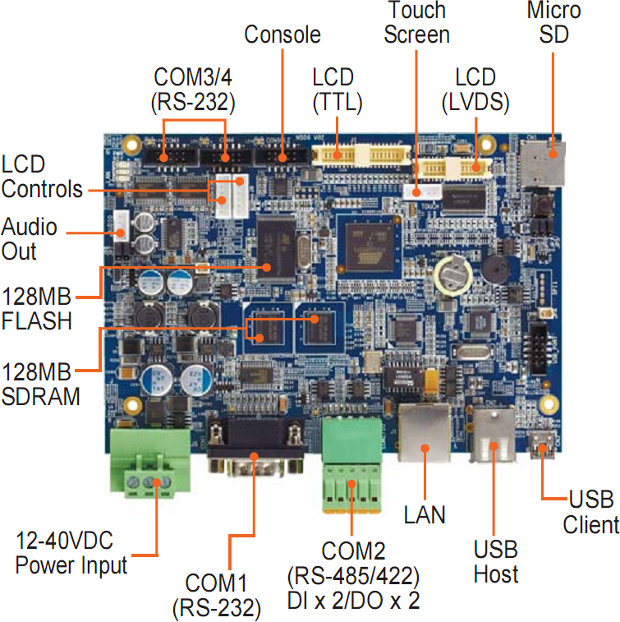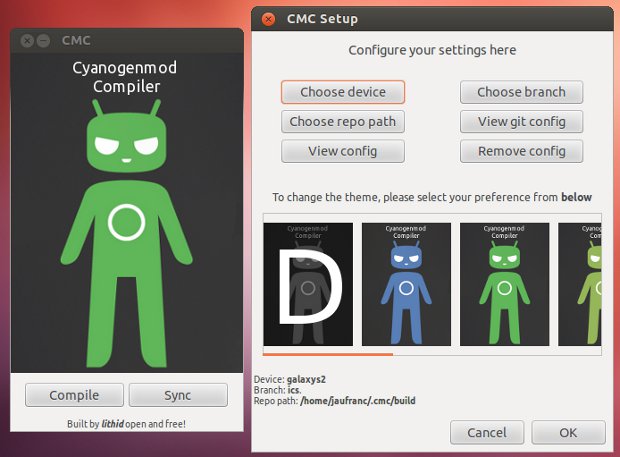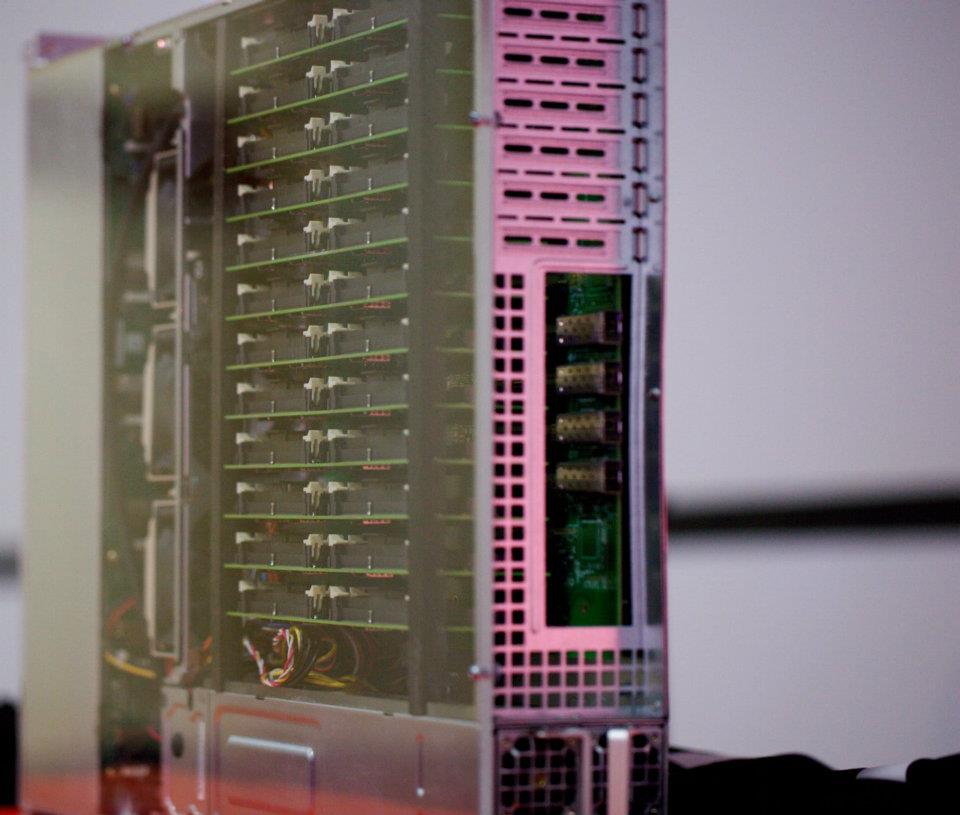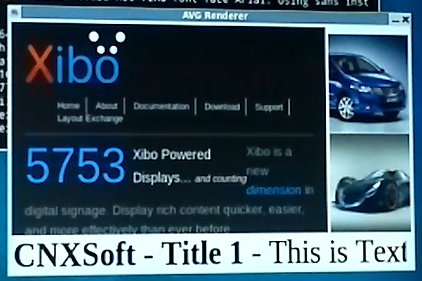Artila Electronics announced 2 new single board computers (SBC) based on Atmel SAM9G45 ARM9 Processor: Artila M-506 running Linux 2.6.38 Artila M-606 running Wince 6.0 Both models features the same hardware with a standard 3.5” form factor, Atmel AT91SAM9G45 Processor, 128MB DDR2 RAM, 128MB NAND Flash and 2MB DataFlash and only differ by the operating system and software used. The company explains that the board targets industrial application such as intelligent transportation system (ITS), building automation, energy-saving system, and scenario control systems. Here are the hardware specifications for both devices: CPU – ATMEL AT91SAM9G45 @ 400MHz Memory – 128MB SDRAM Flash – 128MB NAND & 2MB DataFlash for system recovery On-board TTL/LVDS LCD interface Supports 5V/12V TFT LCD panels, up to 1280 x 860 pixels Ethernet: 1x, 10/100Mbps COM port – 3x RS-232, 1x RS-422/485 USB Host – 4x USB 2.0 HS ports. Micro-SD Card – 16GB max. GPIO – […]
Build Your Phone Android Distro with CyanogenMod Compiler 0.4 GUI (Cmc-pygtk) for Ubuntu
Lithid, a member of XDA Developers Forum, has recently released the 4th version of a GUI tool (Cmc-pygtk) to build Android for a given smartphone as long as it is supported by CM. The CyanogenMod Compiler is supported by Ubuntu 10.04 32/64-bit and greater, and you can either download a deb file or build it yourself by following the instructions below: Install dependencies:
|
1 2 3 4 |
sudo apt-get install build-essential devscripts ubuntu-dev-tools debhelper \ dh-make diff patch cdbs quilt gnupg fakeroot lintian pbuilder piuparts \ flex bison gperf libsdl1.2-dev libesd0-dev libwxgtk2.6-dev squashfs-tools \ libncurses5-dev zlib1g-dev openjdk-6-jdk pngcrush schedtool |
Clone the source tree:
|
1 |
git clone git://github.com/lithid/Cmc-pygtk.git |
Generate a gpg key:
|
1 |
keygpg --gen-key |
Delete the changelog or dpkg will use lithid key instead.:
|
1 2 |
cd Cmc-pygtk rm os-versions/common/changelog |
Edit the EMAIL field in the Makefile and replace it with the one used to generated the gpg key. Build it for your version of Ubuntu. For Ubuntu 12.04 32-bit:
|
1 |
make cmc-12.04-32 |
And install it:
|
1 2 |
cd out sudo dpkg -i cmc-12.04-32-v0.4.deb |
Before using CyanogenMod Compiler (CMC) is installed, you need to install google repo tool:
|
1 2 3 |
curl https://dl-ssl.google.com/dl/googlesource/git-repo/repo > repo chmod a+x repo sudo mv repo /usr/local/bin/repo |
Now that everything is setup, you can run CyanogenMod Compiler: cmc A disclaimer message telling […]
This is What a Calxeda 192-Core ARM Ubuntu 12.04 Server Looks Like
Last November, Calxeda announced its 32-bit ARM Chip for servers, and now there are been some good progress as Calxeda is currently showcasing a 192-core ARM Server running Ubuntu 12.04 LTS Server edition at the Ubuntu Developer Summit in Oakland, California. The server showcased has 192 cores (48 Calxeda EnergyCore quad core Cortex-A9 processors), consumes less than 300 Watts, supports up to 24 SATA drivers and runs Ubuntu 12.04 with OpenStack’s cloud management infrastructure. Karl Freund, Calxeda Vice President of Marketing said that the Calxeda server is running “a standard LAMP stack (running Calxeda’s website) along with other popular web frameworks such as node.js and Ruby on Rails, provisioning of OpenStack Nova compute instances, and even Canonical’s Metal-as-a-Service bare-metal provisioning.” The company also explained that a complete native build of the Ubuntu 12.04 kernel took less than an hour to build on a single node, 4 times faster than the […]
Importing Source Code to Github
Github is a hosting service for software development projects using the Git revision control system. GitHub offers free accounts for open source projects (public repositories) and commercial plans for private repositories. I’ve been using github for a while to clone source code, but I had never imported existing source code to github. Here are the steps to follow: If you don’t have an account yet, sign-up for github. Setup github for Linux, Windows or Mac OS X. Create a repository as shown as explained here. You should now have a URL in github, something like git@github.com:user/repo_name.git, which we’ll use below. Go to the directory with your existing source code and create a local repo:
|
1 2 3 |
git init git add . git commit -m "Initial commit" |
Finally, type the commands below to add your code to your new repository:
|
1 2 3 |
git remote add somename git@github.com:user/repo_name.git git pull git@github.com:user/repo_name.git git push somename master |
That’s it, anybody should now be able to clone you code as follows:
|
1 |
git clone git://github.com/user/repo_name.git |
NB: If your existing source code (or […]
Editing AllWinner A10 Board Configuration Files (script.bin)
AllWinner A10 based devices all have board configuration files in binary format, sometimes refereed to as script.bin, evb.bin, sys_config.{product_nane}.bin store in the FAT partition with the kernel. You may want to decode those binary files to configure your hardware and/or disable/enable peripherals. For the Ubuntu image provided for the Mele A1000 set-top box, the file is called evb.bin and the two other files (mele.bin and sys_config1.mele_mod.bin) are not used. The filename can change since it is configurable in u-boot e.g.: load1=fatload mmc 0 43000000 evb.bin bootcmd=run load1 boot_mmc If you want to decrypt the binary files into text format (fex), you can retrieve bin2fex tool: git clone https://github.com/amery/sunxi-tools Build it: cd sunxi-tools make This will compile both bin2fex (binary to fex text files) and fex2bin (fex files to bin), but the later does not seem to work right now. fex2bin also works now. If you want to decrypt a configuration […]
Xibo Digital Signage Running on Mele A1000 AllWinner A10 Set-Top Box
Those following my blog know that I recently bought a Mele A1000 to play around. For those who are not familiar with this device, the Mele A1000 is a $70 Android set-top box featuring an AllWinner A10 cortex A8 processor and lots of peripherals, and it can easily be hacked to run a Linux distributions. This hardware would also be a great digital signage player thanks to its video playback capabilities: up to 2160p video decoding and 1080p video output. Last year, I ported Xibo, an open source digital signage player, to ARM and ran it in the Beagleboard emulator (qemu), but I hadn’t had the opportunity to try it out in a real hardware. I’ve tried this rootfs based on Linaro ARM Linux Internet Platform (ALIP) image for BeagleBoard in the Mele A1000, by following an adaptation of the method I provided earlier. For this demo, I created a […]
Getting Started with MultiArch (armel / armhf) in Ubuntu
Until now, I used xapt and dpkg-cross to install cross libraries for armel, but since I’ve upgraded to Ubuntu 12.04, it appears to be broken. I’ve contacted Linaro about this issue, and the “cross-building” expert at Linaro (wookey) recommended me to use multiarch instead, as xapt/dpkg-cross will be eventually deprecated. He provided me an example showing how-to use multiarch to build Chromium. I’ve been looking for a “How-to multiarch”, but haven’t been able to find something really clear and simple, so I thought I would post it here. In the example, they used a chroot for cross-building, which is probably a good idea to avoid messing up with the system. It’s also possible multiarch is not 100% reliable, and I’ve read stories where people messed up their system when using multiarch with i386 (32-bit) and amd64 (64-bit). Preparing a chroot for cross-building I’ll use a 32-bit Ubuntu precise chroot, but […]
Tizen 1.0 SDK and Source Code Release
The Tizen Technical Steering Group has announced, today, the release of Tizen 1.0 “Larkspur”. Tizen 1.0 release provides several new SDK features and improvements including: Simulator: A new browser-based tool that supports the Tizen APIs and allows you to run and debug your web applications, and simulate running applications with various device profiles. IDE: Enhancements include more flexibility around templates and debugging tools. Emulator: Significantly improved emulator performance through Intel’s Hardware Acceleration Manager for Windows and OpenGL acceleration for Linux. Updates to the platform source code include: Web: Support for additional features of W3C/HTML5 specification Location: Support for POI (Point of Interest) and route search Connectivity: Wi-Fi Direct key features added You can see the full list of changes by reading the release notes for the SDK and the source code. Tizen has also added a bug tracker and a wiki for the community and a few back-end changes have been […]








